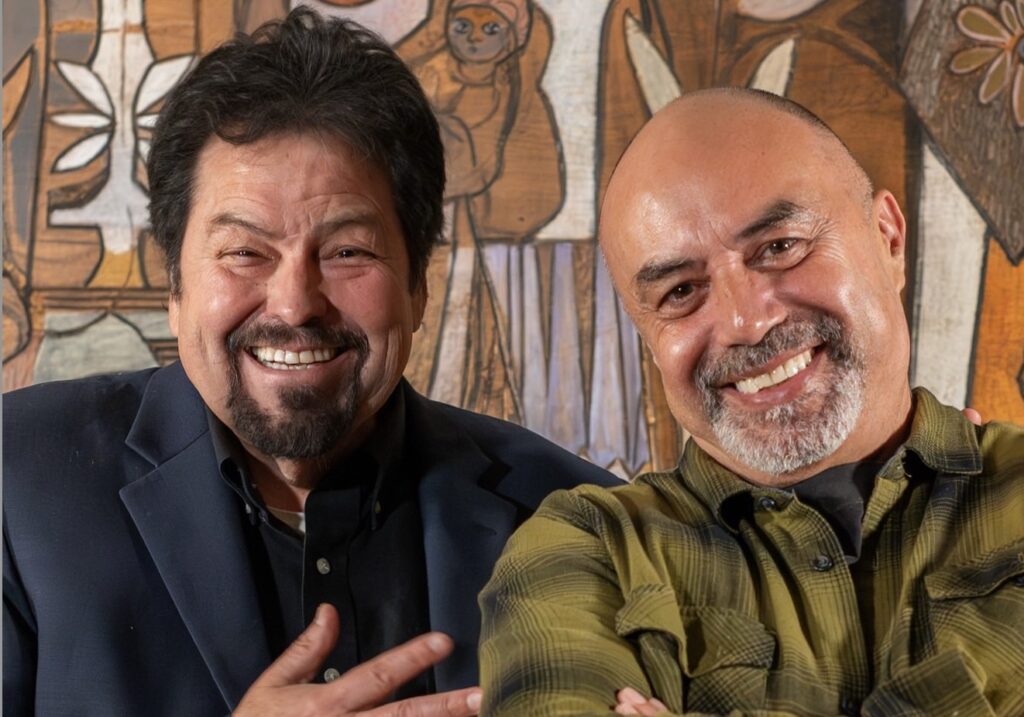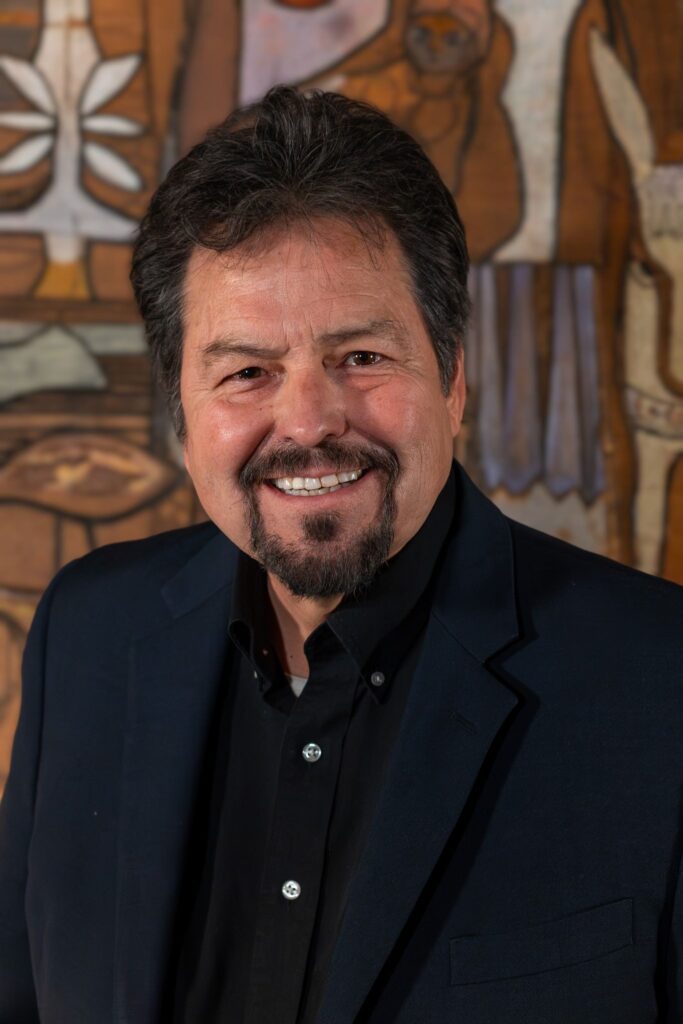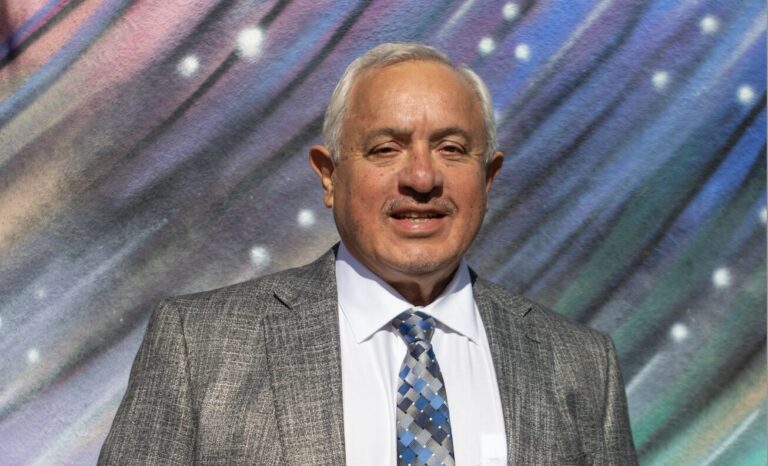Truth, Compassion, Laughter, and Love: His Guiding Forces
By Melanie Slone
Tickets: https://oceansidetheatre.org/latin-history-for-morons/
“If I’m doing this play, ‘Latin History for Morons’, I want to do Latinos right,” says Rick Nájera, award-winning actor, writer, producer, and comedian. “Latinos are the solution, not the problem.”
Rick is performing the comedy monologue ‘Latin History for Morons’ at the Brooks Oceanside Theatre through June 8. The one-man show written by John Leguizamo is directed by Herbert Sigüenza, of the theatre troupe Culture Clash.
For Rick, it’s not just a play; it’s necessary theatre. “It’s resistance in a comical form, history told hilariously, told from truth,” he says.

Rick Nájera’s Story
Rick, the author of ‘Latinologues’ and a writer for ‘In Living Color’ and ‘Mad TV’, considers himself the grandson of rebels. “My family’s always been kind of rebellious. They were never part of the mainstream,” he says. Originally from Chihuahua, Mexico, they first moved to Alamogordo, New Mexico in 1910, then to Logan Heights, and finally, to the La Mesa area, where Rick says there weren’t many Mexican families.
Yet, three Latino neighbors from his generation all “made it big,” as he says: US Congressman Juan Vargas who grew up on a chicken ranch in National City; Elena Ochoa, the astronaut and first Latina in space from La Mesa; and he, Rick Nájera the writer and actor. As Latinos, “we have the pressure of, you can’t be small. You have to be the best that you can be.”
The son of a sheet metal worker and a restaurant server, Rick grew up in a two-bedroom home with four siblings. “I remember my mother would come home with leftovers. And that would be my dinner. I would kid her, there’s a cigarette butt in my steak…I was always a comedian,” he says.
“But I remember being hungry. Not starving. But there’s a few times where food was low.” Yet, he says those were the happiest times of his life. “You don’t know you’re poor unless you’re with rich people,” he says.
Rick notes, “It was also a good time in America that people could dream …There was a certain amount of reality back then that you could make it.”
Dealing with dyslexia, Rick says he flunked kindergarten. But one teacher saw a spark in him and helped him write down his stories, eventually making a cardboard book of them. “Since then, I’ve had a master’s in fine arts. I’ve got a BA in communication,” he says. “I’ve been a professional actor and a writer throughout my life.” And he still thanks that teacher today.
He says being Latino was never an advantage in getting scholarships or getting ahead in life. As the only Latino accepted to the BFA program at UCLA his freshman year, he couldn’t attend because he was unable to get a scholarship. “I couldn’t afford to go. That broke my father’s heart.”
He credits his father for his success. “My dad was the most positive man I’ve ever met. And I think I became what I became because he believed in me. No matter what. Being a guy who flunked in school, a Mexican with five kids in the bedroom, poor. He was always, you can do it.”
His father got him into acting and writing. “He took me to a movie, ‘Cromwell’; Oliver Cromwell was giving a speech to Parliament …And my dad said, if you could speak beautiful like that, I’d be so proud of you. So, I started reading Shakespeare.”
At first it was overwhelming. “How can I write compared to Shakespeare?” he wondered. But, he explains, “Part of being an artist is learning it’s okay to start off not great… I became an expert in Shakespeare.”
Latin History for Morons

‘Latin History for Morons’ is Rick’s latest play. “The show is hopeful. It’s welcoming. I’m not about to go up on stage for an hour and a half and make people not have a good time. And not think,” he says.
“The idea of America is that out of many comes one,” he says. “Me celebrating my culture doesn’t take away from your culture…I don’t want to see more division by me performing this. I want to make people inspired.”
Having faced prejudice, Rick knows its roots. “One of the most important questions in the play is, why do people treat us so bad?” he muses. “Ignorance, we have a history of ignorance.”
He says, “If you think Latinos are the solution and never the problem, then you’re going to have a really good time. They’re the solution…We’re a $2.6 trillion economy. If California today is the fourth-largest economy in the world, and we are a big part of that population, what is that telling you?”
As an actor, he says the struggle is real. “To be a Latino in Hollywood, you can never turn down a job…Right now about 3% of the characters on camera are Latino…In Los Angeles, which is 50% Latino, you’re telling me you can’t find a Latino for that role? And it’s even worse for writers.”
He says today it’s a bad situation for Latinos overall. “It’s hard for Latinos to believe people don’t like us because it makes no sense to us. We leave $US100 billion in taxes…We’re supporting America. We’re the ones creating the jobs,” he says.
“That’s part of the story of this play, of getting us to stop thinking we’re second-class citizens and realizing who we are. …we love to give; we love to help and treat people well.”
Yet, he says, “We forget our history. We have to know and respect our history.”
Rick is as honest as possible on stage. “I’ve never said anything on stage that’s a lie. And I never will. So, if you come to the show, you’re going to hear a lot of truth…It’s no longer the performer and the audience. It’s us in dialogue. Welcome to my house. No one is more giving than a Latino…And I want people to see that.”
True Greatness
Rick believes compassion is the greatest human gift. “It is the hallmark of what makes us great, of any nation,” he says. “Love is the greatest gift.”
For him, ‘Latin History for Morons’ is an extension of that belief. “My performing is an act of love. My talking about Latinos and this great civilization, who we are as a people, is an act of love.”
Still, he says, “It doesn’t mean I don’t love Anglo America. I love the whole idea of what America is… what our ideals are.”
Having studied the Constitution, Rick notes that “the fact that we could find a common ground and agree on these principles for a nation is to me stunning…America is about people who agree with the Constitution.”
It talks about “We the People…And ‘People’ implies everyone. Some of these people you may not agree with. People that are disabled. Or people that are a different ethnic group.” But they are all We the People, he says.
Rick believes that through art, the truth can be revealed. “I try to be on the side of truth. And that may offend people.”
Just as art is visionary, says Rick, so are the immigrants who came to this country seeking a better life for their families. “They were brave enough to step away from their world and go somewhere; either by poverty or desperation, they chose to be brave.”
He is also proud that his family members served in the US military, including his uncle who was killed in war, and his father. Rick has entertained the troops overseas. Rather than go into service, he followed his father’s advice to “make people laugh…make them laugh telling stories. Inspire them,” he says.
Today, Rick’s show ‘Latino Thought Makers’ banks on his comedic genius to inspire others, hosting and interviewing leading Latino empowerment figures.
Tips for Aspiring Artists
“A lot of times when I write something really good, I go, where did this come from?” says Rick. “I think to be an artist you really have to be humble because the best art comes not from you; it comes from the universe, from God, or inspiration.”
As a writing teacher, Rick helps people become storytellers. “The story is more important than the verbiage. Or the spelling. Or the grammar.”
Don’t expect perfection, he warns. “I tell people, it’s okay not to be perfect.” Because of his dyslexia, he can’t spell. “If I sent you something I wrote, you’d be like, this guy is an idiot…But I tell people, look, I’m a writer; I’m not a speller. Most people treat writing as an assignment.”
He also supports fellow actors. “I’ve seen the worst actor become the greatest actor. So, I’m patient with people.”
Rick urges all artists to focus on their truth. “I’ve never written anything that’s a lie…I’ve always been truthful…The truth is brave. Stand up there pretty much naked to the world and tell your story—a level of honesty and truth that most people can’t deal with,” he says.
He urges writers and actors to be themselves so they can be original. “Be more of you…The people that have stood out in my mind are always the most original. …Be yourself. Because that’s the thing you know more than anything else.”
And “being an artist, you have to be empathetic,” he says.
Rick urges others to surround themselves with cheerleaders. “Losing my dad was the hardest thing I went through because I stopped having a cheerleader. And we need cheerleaders. So, my advice to anyone who reads this is, get some cheerleaders around you.”
We are all invited to cheer for ‘Latin History for Morons.’ “If you want to see a show that makes you proud to be a Latino, or you have a friend who is a Latino, come see the show,” says Rick Nájera.



